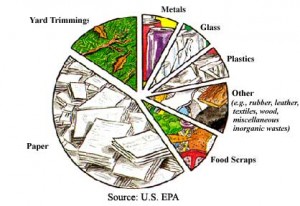
Tonight at Sociology Professor Barnum’s Soup and Bread discussion in Dickinson’s Treehouse: The Center for Sustainable Living, we covered a variety of issues, one of them being trash. In a consumer society where items are created to last no more than three years, trash has become a much bigger part of American society than most Americans realize. According to Forbes, the U.S. is responsible for producing ¼ of the world’s waste, meanwhile making up only 5% of the world’s population. That’s way too much trash, and too much trash too responsibly remove from society.
How did Americans become so unaware of their waste habits? After all, according to Edward Humes, author of Garbology, per capita waste levels have doubled in the U.S. since 1960. Think of the phrase “out of sight, out of mind”. Once an American puts the garbage out on the side of the curb each week, the trash is no longer their problem and they can move on to collecting waste for the next week. The rest of the world, however, is not so ignorant toward the U.S.’s trash problem. Just take the floating trash island in the Pacific- an “island” made of plastic debris deposited into the ocean which will never fully decompose.
[youtube_sc url=”https://www.youtube.com/watch?v=fKBWNVNzaPo”]When there were no municipal waste programs (granted there were, however, major health problems), people were reminded constantly of their trash- by its smell and its appearance. With American’s desire for homes to look pristine and neat, trash could definitely get in the way of this. If American’s were forced to deal with their trash for more than seven days at a time, actions and attitudes might be different. Disposable toothbrushes, Brillo Pads, and excessive paper handouts would feel more threatening once they needed to be stored for more than a week, making them no longer out of sight and so hopefully no longer out of mine. With a more “in your face” approach to America’s trash, the disgusting and greedy extent of its waste products could possibly decrease.
A good link to check out: www.zerowasteamerica.org.

Keziah – I am really bummed out that I missed out of the Soup and Bread event at The Treehouse today, but I am so glad that this blog post sums up what the discussion focused on. A friend of mine shared this link with me regarding the lifespan of a plastic fork and I thought that it would be a great addition to this blog post. Here is the link: http://www.thelmagazine.com/newyork/the-life-of-a-plastic-fork/Content?oid=1592168 . I often find that it is so easy for people to forget about where their trash goes after they dump it out. It suddenly becomes this invisible sort of “brush-your-hands-off type of mentality”. This notion that the waste has “been taken care of” is absolutely ridiculous to me. I think that in order to facilitate a more conducive effort for entrepreneur businesses to become increasingly sustainable it should be mandatory to create as little waste as possible.
Keziah, thanks for those comments. Liz, thanks for jumping in on this.
I have another link to add: http://storyofstuff.org
Prof. Barnum mention the Story of Stuff, but it is worth taking a look at it.
I have a thought for you all. I have always been perplexed by this idea of being so focused on trash and getting people to recycle. I agree that consumerism is the problem and we need to buy less, but purely from the trash perspective, you hear all the time “recycle more”. I don’t get it. It seems like a waste of time to me because the real problem is global warming. I recycle and I won’t stop anyone from doing it, but that is not the issue. We could have a clean and pristine planet, but if we mess up the atmosphere, we are in trouble. It seems to me like too much attention is placed on solid waste and not enough on gaseous waste. We need to focus on CO2 not plastic. Thoughts?
I agree Will, the biggest problem is definitely global warming and recycling is not a way to address this problem directly. It is important to keep in mind the relation, albeit a small one, between the two environmental issues as dumps and trash mountains buried on land do in fact emit greenhouse gases such as methane which do add to global warming. Although recycling should not be a focus on global warming, trash can be, and is, an emitter of greenhouse gases that shouldn’t be completely forgotten.
From an entropy and energy standpoint recycling is essential. When you recycle you are essentially reducing entropy with a relatively small energy input. Take the example of paper, recycled paper has a much smaller carbon footprint than virgin paper- in addition to the massive amount of water saved through the production of recycled paper. So I think it is essential to push the recycling conversation forward, and more importantly the reuse conversation. Another way to focus on the CO2 vs. plastic conversation would be looking into replacing petrol plastics with bioplastics (which are very easy to recycle).
Justin, I agree, but in terms of scale, recycling is not much. We need energy emissions to plummet and manufacturing raw materials does play a role in that, but it is the scale that matters. We need to be pulling the fossil fuel plants offline and replacing them with clean energy, not just reducing our emissions from the making of paper. Does that make sense?
Here is where I do think recycling is valid. If we promote recycling, people will recycle more. If people recycle more, they feel like they are part of the movement. If people feel like there are part of a movement, they are more likely to vote for politicians who will do something on climate change. If politicians do something on climate change, problem solved. Does that make sense?